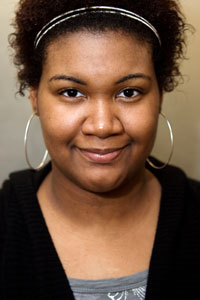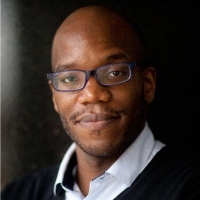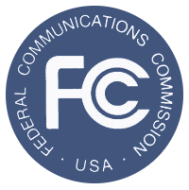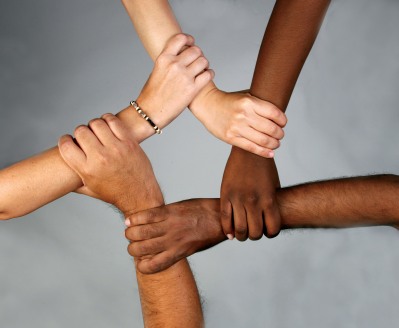Why news sites that focus on race & culture don’t ban comments
27 Friday Sep 2013
Posted in Uncategorized
27 Friday Sep 2013
Posted in Uncategorized
26 Thursday Sep 2013
Posted in Diversity, Journalism, Media, Policy
Tags
comment sections, comments, culture, news sites, online news, race, trolls
Moderating comments at websites that focus on the topics of race and culture can be a pain, but it’s not as bad as some might think, according to at least two high-profile bloggers who specialize in writing on these issues.
 Latoya Peterson, owner and founder of Racialicious, a blog that focuses exclusively on race and pop culture, said negative comments on her site are no worse than those that can be found on other websites, including Popular Science, which announced this week that was killing its comments sections because of “trolls” who prevent intelligent online debates from taking place.
Latoya Peterson, owner and founder of Racialicious, a blog that focuses exclusively on race and pop culture, said negative comments on her site are no worse than those that can be found on other websites, including Popular Science, which announced this week that was killing its comments sections because of “trolls” who prevent intelligent online debates from taking place.
“In the beginning we had to be really heavy handed since a lot of people weren’t used to talking about race and racism with nuance,” Peterson told allDigitocracy in an email. Now people are too embarrassed to leave silly comments. But that’s more the community self-regulating than anything we do.”
Rethinking how to handle comments on news sites has been all the rage this summer. The same day Popular Science informed readers the magazine would ban comments, Google announced that it planned to clean up comments sections on Youtube, immediately. Starting on Tuesday the internet giant began rolling out enhanced moderation tools designed to help video owners “guide the conversation,” CNET reports. Fed up with trolls — people who post inflammatory or off-topic messages in an online community in order to provoke or sow discord – Huffington Post Media Group began banning anonymous accounts this month. “Huffington Post users won’t be able to create anonymous accounts to post on the site; going forward, their identities will have to be verified internally,” Managing Editor Jimmy Soni wrote in an online post explaining the decision. “HuffPost recognizes that many people are not in a professional or personal situation where attaching their name to a comment is feasible, and this change will not require users to identify themselves in connection with each comment. Rather, we will ask users to verify their identity when creating an account, which will reduce the number of drive-by or automated trolls.”
While HuffPost does not focus exclusively on race, ethnicity or culture, it had become notorious for playing host to some of the most virulent comment exchanges on the web, especially comments in response to stories about politics, race or crime. Interestingly, the nasty comments appeared to be less rampant on the company’s niche sites, including HuffPost Black Voices, HuffPost Latino Voices and HuffPost Gay Voices, perhaps because the so-called trolls didn’t bother seeking out the niche pages. (Inflammatory comments would appear if a story — thanks to Huffington Post’s much praised algorithms — became so popular that it got bumped from the niche page to one of the company’s main news or entertainment pages.)
Banning comments on blogs wholly about encouraging conversation and understanding around the often volatile topics of race and culture appears to go against their core missions.
Gene Demby, a blogger for National Public Radio’s newest blog about race, ethnicity and culture, Code Switch, said on Twitter that if his site didn’t heavily moderate “literally every conversation would turn into a bunch of ranting about… immigrants and ghettos.”
Posted directly on the Code Swith blog is a list of comments moderators find objectionable. It states that there are four types of comments Code Switch automatically deletes:

One angry commenter created a Facebook page calling for NPR to fire Code Switch bloggger, Gene Demby.
The manner in which Demby and other Code Switch team members moderate has become such a thorn in some commenters’ sides that they’ve “popped up on other NPR blogs complaining about it,” said. One commenter even created a Facebook Fan page as a result, calling for Demby to be fired. (The profile image on the Facebook page is an upside-down picture of Demby and it had 37 LIKES when I last viewed it. As one can imagine the comments are interesting to say the least)
“The internet is a big place. (Commenters) can say whatever they want, but they can’t say it at @NPRCodeSwitch,” Demby said.
While allowing negativity to flourish in his blog’s comments section can be counterproductive, Demby also recognized that those who disagree with him and others on the site can produce “useful friction.”
“There are productive conversations that can happen in comments sections, but those sections need to be moderated,” he said.
Peterson over at Racialicious agrees. “Trolls are trolls, they live everywhere,” she said. “Comment moderation is a pain, but the community we cultivated at Racialicious teaches us as much as they comment, so it all works out in the end. And a lot of our readers/commenters become writers/tipsters so it all works out.”
25 Wednesday Sep 2013
Posted in Journalism, Media, newspapers, On Writing, Technology
Can soap operas teach newspapers how to survive?
20 Friday Sep 2013
Posted in Uncategorized
Free Flow of Information Act: how problematic?
Tracie Powell, founder of allDigitocracy, is interviewed about the Free Flow of Information Act the Senate Committe on the Judiciary passed a week ago. It grants privilege for ‘covered parties’, with an exception for cases deemed to be critical to national security. It amounts to a federal media shield law similar to laws already adopted by 49 states.
In a nutshell I say that this is an imperfect first step in protecting journalists and helping them to carry forth our constitutional responsibility of keeping power in check. But the legislation also opens the door to defining who is and is not considered a journalist, something that is problematic for anyone engaged in gathering, preparing and producing information for the public good. Listen In.
26 Tuesday Mar 2013
Posted in Diversity, Journalism, Media, Mergers
Tags
 NBC News is drawing fire this week from multiple corners. New York Magazine on Sunday published a scathing report on the machinations behind the ouster of former Today Show co-anchor Ann Curry. A day later media observers learned that the “Peacock Network” promoted an interview with convicted child molester and famed college football coach Jerry Sandusky without initially telling viewers that the interview was actually conducted by a controversial conservative filmmaker, not by anyone at the network itself.
NBC News is drawing fire this week from multiple corners. New York Magazine on Sunday published a scathing report on the machinations behind the ouster of former Today Show co-anchor Ann Curry. A day later media observers learned that the “Peacock Network” promoted an interview with convicted child molester and famed college football coach Jerry Sandusky without initially telling viewers that the interview was actually conducted by a controversial conservative filmmaker, not by anyone at the network itself.
Both revelations are likely to be seen as serious breaches of the public trust, a trust with US news organizations that is already under significant strain, a study released last week by the nonprofit PewCenter for the People and the Press found.
The failure to inform viewers about the Sandusky interview may seem particularly egregious — not just because the network is granting air time to a convicted pedophile — but also because journalists are supposed to be open and transparent about our decision-making and how we cover news. We promise our audiences that we will be honest about who we are, accountable for our mistakes and open to a variety of ideas and perspectives. NBC failed to uphold at least two of these charges, although Matt Lauer did try to get out in front of some of the controversy Monday morning by interviewing John Ziegler, the conservative documentary writer and director who interviewed Sandusky. (Ziegler also believes that Sandusky’s trial was riddled with errors, but that’s another story for another day.)
Still, one can’t help but question why wasn’t NBC more up front in the first place? Perhaps in the rush to boost sagging ratings network executives simply forgot. Or maybe it has more to do with the fact that NBC is now owned by a major cable and entertainment conglomerate, Comcast and Universal Studios, which has replaced hard analysis with more sensational news. Gone are the heady days of serious news reporting when American journalists actually asked the questions and fact-checked their findings.
Then there’s the messy affair that exposed just how cutthroat the US news business really is. Curry, who is biracial with Japanese roots, had held down the news anchor position at Today since 1997 and worked her way up to co-anchor in 2011. Curry held the title for just one year when she was unceremoniously dismissed after ratings faltered against ABC rival, Good Morning America. Curry’s tearful exit is viewed as a setback for journalists of color, particularly Asians. Cable news has been in the spotlight in recent weeks for its lack of diversity, but truth be told, all of American journalism suffers from this same ailment, including network television newscasts. The dearth of minority journalists was only underscored when Curry was replaced by current Today Show co-anchor, Savannah Guthrie, who is white. Half a million viewers have abandoned Today since Curry’s ouster, in fact it has not won a week in ratings since Curry left the show, according to the Pew report. NBC executives have spent months telling viewers that long-time host Matt Lauer had nothing to do with his former co-anchor’s messy departure. Now we have confirmation for what we suspected all along– that NBC’s spin couldn’t be further from the truth.
Again, the network should have just come clean in the beginning. With journalism in a tailspin, the news media can ill-afford to purposely push viewers and readers away by sowing seeds of distrust. To the contrary, we need to figure out ways to re-engage and rebuild relationships with audiences. We can start by being open and honest.
The peacock became the official logo for NBC in 1957 and remains one of the most recognizable brands in the world. With high-powered anchors like David Brinkley, John Chancellor and Tom Brokaw, the peacock network was a shining example of how news was supposed to be done.
Moves like Curry’s dismissal and the Sandusky interview illustrate just how damaged the brand that is NBC News has become. The question going forward is whether NBC can regain its perch as a trusted news source or if it will continue a flight toward journalistic irrelevance.
28 Friday Dec 2012
Posted in Uncategorized
By Tracie Powell
 The Federal Communications Commission has delayed until January it’s decision on whether to further relax a long-standing rule that limits the ability of companies to own both a newspaper and a television or radio station in the same local market. Supporters of the rule argue that it is outdated, while opponents say it will further weaken media ownership by blacks, Hispanics and those representing other ethnic groups.
The Federal Communications Commission has delayed until January it’s decision on whether to further relax a long-standing rule that limits the ability of companies to own both a newspaper and a television or radio station in the same local market. Supporters of the rule argue that it is outdated, while opponents say it will further weaken media ownership by blacks, Hispanics and those representing other ethnic groups.
Truth is, the rule change is a double-edged sword, which is exactly why journalism associations such as the National Association of Black Journalists, shouldn’t just sit on the sideline as impartial observers while others shape policy; they need to weigh in.
The F.C.C. already allows companies to seek waivers to own both a newspaper and a station in the same market. The New York Times reported earlier this month that the News Corporation owns The New York Post and two television…
View original post 763 more words
19 Monday Nov 2012
Tags
Roland Martin is a multi-tasker.
 Minutes after finishing a shoot of TV One’s “Washington Watch with Roland Martin,” the Texas-bred Martin scarfs down lunch in the entry way of the studio while meeting with producers to plan the guest list for the next show.
Minutes after finishing a shoot of TV One’s “Washington Watch with Roland Martin,” the Texas-bred Martin scarfs down lunch in the entry way of the studio while meeting with producers to plan the guest list for the next show.
On his walk down to the garage of the glass-front building that is Washington, D.C. headquarters for TV One, Martin twice interrupts our interview: once to bear hug actor Charles S. Dutton who he had just interviewed and again to trash-talk with a security guard about Texas football. We resume our conversation while Martin cleans out the front seat of his car for an unexpected guest.
I first met Martin when I interned for Cox Newspapers several years ago; he’s always been this way: A juggler who often carries several different titles at once.
He’s a syndicated columnist, author, CNN contributor, and senior analyst with The Tom Joyner Morning Show, all in addition to his roles as host and managing editor of the most diverse Sunday morning news show on television.
The juggling appears to be paying off. Ratings for “Washington Watch with Roland Martin” are up 35 percent and pacing 27 percent ahead of last season, according to a network press release.
CNN’s loss is TV One’s gain
Martin signed a development deal with CNN to create a weekend show, but the network nixed it in May 2009, Martin said. In 2011, MSNBC announced it would launch its own daily news program led by the Rev. Al Sharpton, a move that was blasted by critics including black journalists including Martin.
“It doesn’t make sense that Al Sharpton is the only African American hosting his own show. Not a journalist, but Al Sharpton. All we want is the opportunity, but all we get to hear are excuses,” said Martin who, along with long-time friend and former TV One President and CEO Johnathan Rogers, launched the show in 2009, three months after CNN ditched the idea.
More black Americans get their news from television than whites or Hispanics, according to a Pew Research Center’s Trends in News Consumption report issued in September. Sixty-nine percent of black consumers said they watched TV news the previous day, compared to 56 percent of whites and 43 percent of Hispanics. In 2010 the Pew Research Center’s Project for Excellence in Journalism reported that African American cable subscriptions rose to 61 percent from 59 percent in 2009, while falling for other ethnic groups measured in the same time period. Shows hosted by Martin and Sharpton, the report concluded, might have come at the “right time,” but black oriented TV news programs are rare and few have staying power. Just this week Viacom’s Black Entertainment Television (BET) announced this month that it would be scaling back on “Don’t Sleep,” a nightly show hosted by former CNN anchor T.J. Holmes, due to poor ratings. The show will now air once a week for one hour.
Martin’s show appears to be bucking that trend.
Unlike Other News Shows
“Washington Watch” reaches 142,000 homes, up from 105,000 last season. That may seem paltry compared to network Sunday news programs that reach millions of viewers each week, but Martin’s show is keeping pace with week-day cable news programs in terms of household share. For example, his show garnered a 0.25 household rating, compared to five-day-a-week news programs like MSNBC’s Politics Nation with Sharpton, which garnered a 0.7 percent share and CNN’s Anderson Cooper 360, which received a 0.5 percent share, according to data compiled by Cable News Ranker for June through September 2012.
“That’s huge,” said Martin while maneuvering through traffic in Washington, D.C. “If we were in 90 to 100 million homes like MSNBC, CNN and FOX, we would be doing gang busters.”
TV One reaches 57 million homes, Martin said.
“Washington Watch has allowed TV One to keep our loyal and expanding viewership informed and up-to-date about key issues and current affairs on a regular basis,” President and CEO Wonya Lucas said in a press release last month. Lucas credited Martin for the “leap in viewership,” and said the show has become “an important touchstone for Black audiences” especially during this year’s election.
“I never operated like I needed to work at The Washington Post or The New York Times to do great journalism. For me it’s about the opportunity,” said Martin who ran black newspapers in Dallas, Texas before becoming editor-in-chief of The Chicago Defender in 2004. “My deal is, if CNN did not want to launch a weekend show, fine, we got one on TV One. The opportunity at TV One to helm my own show and to have my name on it where I get to be the host and managing editor… I get to decide whose on it and the topics we cover. That was important to me.
“I don’t believe that TV One is secondary to CNN,” he continued. “I’ve never believed that. It’s the same attitude I had when I ran black newspapers. I never believed that we were inferior.” (Martin mentored me when I ran a weekly newspaper in Dallas.)
Martin got his start in the black press when he turned down an internship with CBS to work for the Houston Defender. He later covered government beats at The Austin American-Statesman and The Ft. Worth Star-Telegram. It was while he was assigned to the City Hall beat in Ft.Worth that a local radio station, KKDA, approached him about doing a show. The Star Telegram blocked that from happening, he said. “I’ve always believed in using all of my skills,” added Martin.
And that’s what he ultimately did. In addition to providing analysis on a radio show with the largest black audiences in America, Martin is also a blogger, an author and prolific tweeter. It was multitasking – watching television and smack-talking on Twitter – that landed him in hot water earlier this year. After being temporarily suspended by CNN, Martin returned to that network, but was largely absent from CNN’s election coverage. Martin was a constant presence on the network in past elections. When asked on social media by followers and by Poynter, Martin responded, “You’ll have to ask CNN about that.”
While he was virtually shut-out of CNN’s election coverage, Martin had his other platforms in which to discuss topics important to black viewers, readers and listeners. He insists that ‘Washington Watch’ doesn’t try to compete with the other network and cable news shows.
“We don’t do what they do,” he said. For one, Martin makes no apologies that his show caters to an audience interested in black issues. “Those other shows are locked into a formula,” he said. “You’ll see more diversity on our show. We have white panelists, we don’t lock anybody out. We just don’t want to hear from the same senator that will appear on those other shows. We want to hear from different voices.”
Producing the show, Martin said, is not without its challenges.
TV One has limited resources, so Martin shoots the show on Fridays because it is more expensive to do it live. The show also has difficulty booking guests, but Martin says he has a “very scrappy, aggressive team.”
“We don’t operate as though we’re less than,” he said.
Filling a gap in coverage
The simplest way to put it: Other Sunday morning shows feature America’s governors; on Martin’s show viewers get to hear from the country’s mayors.
But “Washington Watch” isn’t just a political show. Martin also covers cultural and social issues and he invites guests who represent varying walks of life. Martin’s show doesn’t operate from an ideological stance the way news programs on other cable channels do. On any given Sunday viewers hear from conservative pundits like Republican and conservative columnist Armstrong Williams to progressives like Sirius/XM Radio host Joe Madison.
Viewers also get to see other leading voices often overlooked by the networks and mainstream cable channels. Dutton, who was in the studio the day Poynter visited, talked with Martin about a film he produced called “The Obama Effect.” Sonya Ross, a former White House correspondent and now race, ethnicity and demographics editor in the Associated Press’ Washington, D.C. bureau, is a frequent guest on the show. Democratic strategist and Obama 2012 pollster Cornell Belcher is also a regular. In fact, just two weeks before the election, Belcher talked with Martin about Obama’s ground game, critical in the president’s re-election, which took challengers and much of the media by surprise.
Perhaps if the other broadcast and cable networks like CNN had more diverse voices and experts on air during the election as Martin did, they would have been more accurate with their own polling and would not have been taken aback by minority voter turnout, Ross said.
“If Roland didn’t have a show, would you have seen any real analysis about minority voter participation? That’s something Roland talked about throughout this election cycle,” Ross told Poynter by phone. “Networks are only now talking about it. Pundits are sitting around navel gazing trying to figure out why the vote went down the way it did. So perhaps the better question is if we didn’t have Roland’s show, what would we have seen? I would love to see this show not only continue but to grow. It’s a discussion we should have daily instead of once a week.”
20 Thursday Sep 2012
Posted in Uncategorized
 Diversity at network and local television news stations continues to decline, according to a report released Wednesday by the National Association of Black Journalists.
Diversity at network and local television news stations continues to decline, according to a report released Wednesday by the National Association of Black Journalists.
The organization examined management ranks – not on-air talent or correspondents – where decisions are made about what stories are covered and how they are covered. NABJ found that African Americans, Native Americans, Asians, Hispanics and other people of color are represented in mid-level ranks but not in the upper echelons of TV news management.
NABJ has been conducting this census for the past five years, said Bob Butler, the organization’s vice president of broadcast.
“The first year we did this we looked at the stations that were owned by ABC, CBS, NBC and Fox. There were 61 people of color in management, about 16 percent,” Butler said. “Since that time, it’s gone down to about 12 percent of all the managers being people of color. That’s well below the 35 percent approximately of people of color represented in this country.”
While local stations are at 12 percent, TV networks are in a bit better shape– 34 percent of managers are people of color, according to the study. NBC and MSNBC tend to have the most diversity, Butler said. NABJ gathers the data, and then asks networks and stations to confirm it. Fox did not respond and ABC declined to confirm the accuracy of the data, Butler acknowledged in an interview with National Public Radio’s Michel Martin Wednesday afternoon.
It’s important that newsrooms have diverse voices at the table to ensure they are covering communities of color and that the coverage is fair and accurate, said Butler. NABJ doesn’t just point out the deficiencies, it also offers to help TV newsrooms solve the problem by helping to identify and train TV newsroom executives through its Executive Suite Program, he added. Led by news executives, the program is a series of workshops designed to help middle managers who aspire to more senior roles gain a better sense of what it takes to be an executive editor, a publisher, a news director or a general manager.
The Federal Communications Commission is charged with collecting the data that NABJ currently compiles, “but it hasn’t done it since 1996 and congress is not asking why not,” Butler said.
01 Wednesday Aug 2012
Posted in Uncategorized
Tags
 When it comes to making up stories, parts of stories or sources in a story, typically the same names usually surface: Jayson Blair, Stephen Glass, Patricia Smith and Janet Cooke. I was just getting my journalistic footing when these scribes were revealed to be little more than con artists, and so their names always served to be looming warning signs of what NOT to do in the business.
When it comes to making up stories, parts of stories or sources in a story, typically the same names usually surface: Jayson Blair, Stephen Glass, Patricia Smith and Janet Cooke. I was just getting my journalistic footing when these scribes were revealed to be little more than con artists, and so their names always served to be looming warning signs of what NOT to do in the business.
Too bad, it seems, that they don’t continue to serve as poster children for journalists behaving badly. From the New Yorker’s Jonah Lehr to former New Canaan News reporter Paresh Jha and Wall Street Journal intern Liane Membis who all created sources and quotes out of thin air, it seems that this summer has been filled with headlines about journalists contributing to the continued erosion of trust in our profession.
I don’t know if it was because my mentor professor Conrad Fink, who passed away earlier this year, put the fear of God in his students when he preached about there being no shortcuts, but it seems younger journalists — in higher profile positions — never heard such lectures. I do know that I’ve been questioning what’s happening in the trade, overall, that makes exchanging integrity for short-term gratification so commonplace these days.
Do the guilty parties grapple with the decision to make up a name, a quote, an entire story? Are their stomachs tied in knots about the prospect of being caught? Can they sleep at night? And if so, do they have nightmares about their ethical transgressions? Do they feel dirty when they walk through the doors of respective employers after committing such major lapses in judgement? And finally, is there redemption following such public failures?
 I just learned Jayson Blair, who plagiarized and made up sources and quotes while at The New York Times, now earns about $130/hour as a life coach and Stephen Glass, one of the most sought after reporters who made up sources, quotes and whole stories at The New Republic, is now a lawyer in California. Maybe some of these folks can be redeemed.
I just learned Jayson Blair, who plagiarized and made up sources and quotes while at The New York Times, now earns about $130/hour as a life coach and Stephen Glass, one of the most sought after reporters who made up sources, quotes and whole stories at The New Republic, is now a lawyer in California. Maybe some of these folks can be redeemed.
I don’t know the answers to the other questions.
The American Journalism Review has a piece posted this week that states we can thank Blair and Glass for blaming younger journalists not ready for the big leagues, but the recent round of cheating shows that it’s not just young folks. The recent crop of journalism fabricators includes “a wide array of culprits, from veterans and stars of the profession to those who claimed they weren’t really journalists,” writes Lori Robertson who used to be a managing editor of the magazine and now contributes regularly to it.
Robertson suggests that the journalism culture itself is to blame for its recent series of scandals, namely the pressure to produce more while still beating the competition.
“Newsrooms praise those who get the stuff nobody else gets,” Robertson writes. She quotes Bill Kovach, founding chairman of the Committee of Concerned Journalists, who states that as long as news organizations prioritize beating the competition above integrity, the cheating will keep happening.
Twenty-four hour newsrooms that continue to downsize are also part of the problem, said Robertson. “The more pressure that is put on journalists to produce more, faster, quicker, cheaper, the more the industry encourages cutting corners, which is just another way of saying cheating,” according to Deni Elliott, who teaches media ethics at the University of South Florida, St. Petersburg and is quoted in Robertson’s piece.
Being first and getting stories nobody else gets may be factors, but I’d like to add one more: The star system.
Almost every newsroom has one. It’s that group of people in every newsroom that is designated the in-crowd, the journalists who are highly favored by certain key editors, who are placed on pedestals, given plumb assignments and lots of leeway. They are the guys and girls who, for lack of a better term, are considered prizes for different reasons — maybe they have the right pedigree or know how to talk the right game. Most of the time they are good at delivering the news of the day and good at selling themselves. Ever once in a while they come up with original ideas, or what editors believe to be original. They hang out with or know ‘the right kind of people,’ go to the right parties, live in the right neighborhoods. They have a certain look, most often pretty and petite with nice smiles, or wonky and cute as The New York Times describes Lehr. “… a guy who looks cute and wonky is better positioned to get away with this than others,” Todd Gitlin, a professor of journalism and sociology at Columbia told the Times.
A Yale graduate (Membis) lands at The Wall Street Journal. And by the way, she’s also a beauty queen. Well, she was. Even the best editors couldn’t help being star struck, right? I recently asked a journalist about working for a leading Washington, D.C. publication. That journalist talked candidly about the star system in place there, and how difficult it is to break through and become a member of the newsroom’s ‘elite.’
I think there’s a lot of pressure on these people, these stars, to live up to their own hype, and that is why they lie.
Sometimes stars fade. Other times they crash and burn, hurting their publications, the industry as a whole and, most importantly, themselves. And yes, this keeps happening over and over again. This summer has been no exception.
31 Tuesday Jul 2012
Posted in Uncategorized
Russia TV reporter Marina Portnaya says bias and bungled reporting are causing viewers and readers to turn away from U.S. news organizations. But is citizen journalism an answer to the problem?
Portnaya profiles DailyCloudt.com, an online training ground for citizen journalists. The nonpartisan, independently funded company trains people to write well-sourced opinion pieces. It also maintains a search engine that monitors and explains congressional bills, a tool that allows average citizens to hold lawmakers and corporate leaders accountable when the Fourth Estate fails, according to the report.
Thoughts?